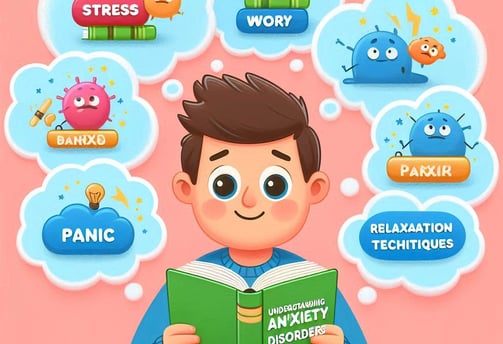Understanding Anxiety Disorders
A simple guide to understand anxiety disorders
6/6/20242 min read


What are anxiety disorders?
Anxiety disorders are more common than you might think, affecting many people around the world. While there are different forms of anxiety disorders, in general they involve intense feelings of fear and worry and can bring about both physical and mentalchallenges. While some amount of anxiety in some situations is normal, excessive fear and an unreasonable tendency to worry needs attention. Anxiety may be generalized with no specific trigger or may be related objects or situations. Sometimes it may be experienced as panic attacks. The anxiety and attempts to avoid anxiety inducing things or situations can affect daily functioning and quality of life.
What are the symptoms of anxiety disorders?
Feelings of fear, persistent worry, distress and uneasiness are characteristic of anxiety disorders. It is often accompanied by restlessness, fatigue, difficulty concentrating and irritability. In some cases, anxiety may be associated with physical symptoms like rapid heart rate, nausea, increased muscle tension or sleep disturbances.
Diagnosing Anxiety Disorders
Diagnosing an anxiety disorder isn't about one quick test. It involves a thorough and careful interview with a Psychiatrist. This process helps rule out other medical conditions or medications that maybe causing such symptoms. If required, standardized questionnaires and psychological assessments can be used to help in making an accurate diagnosis.
Recognizing Anxiety in Children
Anxiety is common in children and adolescents. Children with anxiety disorders may not always show the typical signs we expect. Instead, their anxiety can appear as altered behaviors and physical complaints, making it hard to spot early on. For example, a child might frequently complain of stomach pain or headaches, or they might act out in ways that seem unrelated to anxiety. Understanding these subtle signs is key to getting them the help they need.
Why Early Detection Matters?
Catching anxiety disorders early and starting treatment can lead to much better outcomes. Both talk therapies (like counseling) and medications have been shown to help people with anxiety. The sooner a correct diagnosis is made, the better the chances of effective treatment, which prevents the person from undergoing unnecessary and incorrect treatments. Anxiety disorders if not treated adequately can increase likelihood of other mental health issues like depression, substance abuse disorders. Hence early detection and management is important.
Helping people with anxiety disorders
Persons with anxiety disorders benefit from different types of treatment depending on type of disorder and severity of problems. These include lifestyle modifications, medications and talk therapies. There are effective and safe medications that can help reduce anxiety and improve the quality of life. Persons with some forms of anxiety can benefit from learning ways of normalizing thinking and behaviour (cognitive-behaviour therapy) that will reduce symptoms. Regular physical exercise, good sleep hygiene and stress management are some examples of life style modifications that help in overcoming anxiety.
Conclusion
Anxiety disorders can significantly impact daily life, but with the right approach, they are manageable. Recognizing the signs, especially in children, and seeking early professional help can make a world of difference. With accurate diagnosis and appropriate treatment, those with anxiety disorders can look forward to a brighter, more comfortable future.
